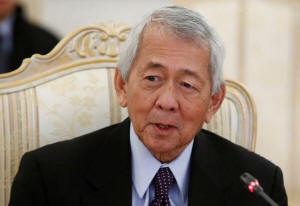|
Philippines won't 'deviate from'
arbitration ruling on China: minister
 Send a link to a friend
Send a link to a friend
 [December 19, 2016]
By Manuel Mogato [December 19, 2016]
By Manuel Mogato
MANILA (Reuters) - The Philippines said on
Monday it will not "deviate from" an international tribunal ruling that
rejected China's extensive claims in the South China Sea but it must
build trust with China before discussing "sensitive" bilateral issues.
China rejected the July ruling by the Permanent Court of Arbitration in
the Hague after the tribunal determined that China had breached the
Philippines' sovereign rights by endangering its ships and fishing and
oil projects.
The ruling, on a case brought by the previous Philippine administration,
soured relations with China but President Rodrigo Duterte, who took
office in the Philippines on June 30, has sought to engage China,
marking a reversal in the foreign policy of the old U.S. ally.
Duterte has played down the arbitration saying, saying it would "take a
back seat" during talks in China in October.
On Saturday, he said he would "set aside" the ruling and would "not
impose anything on China".
Foreign Minister Perfecto Yasay issued a statement on Monday explaining
that "revitalising" ties with China was one of Duterte's priorities and
the government had been working to build "confidence and trust" with
China.

"This we will continue to do for the foreseeable future, until such time
that we achieve a trust level that will allow us to discuss the more
sensitive issues in our bilateral relations," Yasay said.
The government reaffirmed "its respect for and firm adherence to this
milestone ruling" and would be "guided by its parameters" when tackling
the issue of maritime claims in the South China Sea, he said.
"I also wish to reiterate what the president has stated in the past that
he will not deviate from the four corners of the ruling," the minister
said.
Duterte said in a speech later on Monday that "some day" he would have
to bring up the issue of the ruling with China but not now. Instead, he
raised the possibility of sharing any resources in disputed area.
[to top of second column] |

Philippine Foreign Minister Perfecto Yasay speaks during a meeting
with Russian Foreign Minister Sergei Lavrov (not pictured) in
Moscow, Russia, December 5, 2016. REUTERS/Sergei Karpukhin

"If you want, let's just develop the oil there, we can share,” he
said in a speech to government employees, referring to China.
Earlier, a former foreign minister, Albert del Rosario, said he was
disturbed by the government's setting aside of the tribunal ruling
while unwinding military dealings with the long-time ally the United
States.
"The foregoing declarations are most sadly being made after we had
taken a firm rules-based position to defend what is ours – and won,"
del Rosario said in a statement.
"Now, we seem to be on a track to relinquish those gains that have
been made to benefit our people."
Del Rosario was instrumental in challenging China's so-called
nine-dash line on its maps, setting out its extensive South China
Sea claim, and filing the case in The Hague.
Brunei, Malaysia, Taiwan and Vietnam also have claims on the
waterway where about $5 trillion worth of goods passes every year.
(Additional reporting by Enrico Dela Cruz; Editing by Robert Birsel)
[© 2016 Thomson Reuters. All rights
reserved.]
Copyright 2016 Reuters. All rights reserved. This material may not be published,
broadcast, rewritten or redistributed.

 |